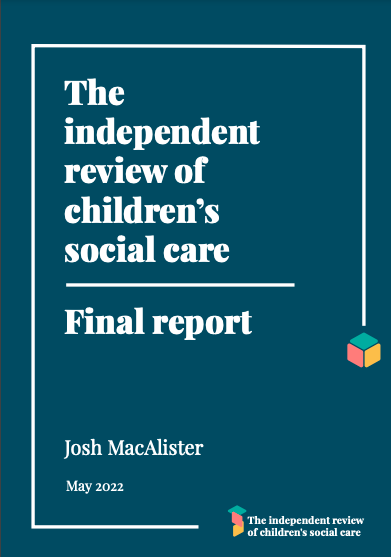The opportunity for a review of children’s social care in England was always a welcome development. The final report of the Independent Review of Children’s Social Care helpfully reminds us that early intervention is key. We have seen the impact on society and the complexities of children grow over the last decade at a time when local government have experienced reduced funding. This has directly impacted on the ability of local authorities to respond.
Yet, this final report misses some key points and as a result comes up with some of the wrong conclusions. We can see that the Review has tried to develop some radical thinking to transform children’s social care, and this is an admirable ambition, but they have missed the mark in this ambition. In particular, we would like to have seen the final report highlight that foster care works; it works well for most children in foster care, most of the time; it is a lost opportunity to acknowledge this.
The independent fostering sector, yet again, is the target of some poorly evidenced, partial reporting. Independent fostering agencies (IFA) are filled with many great foster carers, social workers, administrators and managers doing great things for children in care, cost effectively for the public purse. 93% are good or outstanding in their Ofsted judgements. The single largest consideration for IFAs when placing a child in foster care is the match between that child and the foster carer - not profit. This is another lost opportunity to give these good people the plaudits they deserve. Without IFAs, their fantastic foster carers, and their staff who work tirelessly, our social care system would have collapsed years ago.
We are living in a time when long term foster carers, who do such valuable work looking after children, are facing huge increases in costs with no prospect of an increase in income to counteract. Foster carers now face higher bills for gas, petrol and food, as do social workers and other staff working in the children’s services sector. Similar pressures are faced by local authority in-house fostering services and IFAs. Carers need annual uplifts in fee payments equivalent to inflation to make it viable for them to remain as foster carers.
The money local authorities have to spend from government grants, council tax, and business rates has fallen by 16% since 2010. This means local authorities have an increasingly limited capacity to respond to today’s significant inflationary pressures. These cost pressures feature in and distort all their actions. It is therefore interesting that the chair of the Review has moved from his earlier position with Frontline when he published A Blueprint for Children’s Social Care (2019), and now argues for a significant injection of funding into the care system.
Local authorities and IFAs negotiate around funding issues on a regular basis. However, the resources to address these current pressures can only be provided by government. NAFP believes that government should urgently make a pay award to foster carers, both within local authorities and IFAs to reserve and protect this precious resource for children and young people in need. This would be an important signal to foster carers that the government values their contribution. This is not about achieving savings - it is about investing in vulnerable children to give them the best childhood we can.
Foster carers have been treated as self-employed since 2003 when HMRC introduced a bespoke tax scheme for foster carers (‘foster care relief’). In April 2010, foster care relief was extended and renamed ‘qualifying care relief’. This was the last time this scheme was reviewed. Positively reviewing this now would give a boost to foster carers - morally and financially.
Some radical thinking is possible to improve how we care for children in care and there are gaps here in the report. Local authorities tell us that they are unable to find the placements they need for children in care, where they need them, when they need them. It may be a reality that this will never be possible. There is sometimes a conversation about IFAs not being able to provide all that local authorities need from them. Local authorities view the role of IFAs as topping up what they cannot provide directly through their own in-house services. This automatic preferred provider status for local authority in-house fostering services does not favour children - they deserve a choice made from all that is available - nor effective spending (when current understanding of value and impact is so weak).
Instead, we could turn this around and invite local authorities to commission most fostering services from IFAs - the high quality, cost effective services IFAs can provide - rather than being frustrated at what they cannot provide. The local authorities themselves could then top this up by directly providing the services that IFAs cannot.
One of the accusations directed at IFAs is that they are more expensive than local authority in-house fostering services. Previous reports on relative costs of local authority and IFA services, including Narey/Owers (2018) and backed up by our own work, found that IFAs care for older children with more complex needs, and spend more on their services as part of a broader offer. The final report acknowledges that ‘the review has met with more than 300 foster carers who have told us that, generally, they get better support from for-profit independent fostering agencies’. When this all is taken into account, according to Narey/Owers, the difference in cost is not so significant that it should be a factor in choosing where a child needing foster care should live.
In our view, the nature of the Care Review’s consultation did not enable them to develop a coherent picture of the care system. For instance, the hugely significant implications of commissioning, procurement and contracting are not properly addressed by this final report. Neither are many of the positive local authority-IFA relationships around the country. From early on, it seemed to us that the Care Review team had little interest in engaging with the wider independent sector. As a result, the report has gaps. The little engagement we took part in was of a somewhat disorganised nature and lacked focus. After that, our offers to engage with the Review team were largely ignored.
If local authorities need help to take back control of the care system, as the report suggests, we should be asking why/how/if they lost control in the first place. Overwhelmingly, local authorities and IFAs work well together. The nature of mutual understanding, acceptance and collaboration has improved significantly over the last decade. We are not clear how another layer of regional commissioning will address this. In fact, regional commissioning of IFAs has been in place for some time - evidence of its effectiveness is limited and the final report does not seem to have addressed this. It has simply lead to a system with procurement frameworks sitting on top of frameworks, with both local authorities and IFAs needing to employ additional staff just to manage these overly bureaucratic systems.
Children in care and foster care as a whole continue to be subject to negative messages in the media and the public domain. The media sometimes seem to be only interested in ‘bad news’. And too many sector leaders use their public voices to divide and blame. There is a collective responsibility to address this. We all need to think carefully about how we can be part of the solution, and not part of the problem. Government can help with a massive public awareness campaign to lift the hearts of children in care and current foster carers, as well as tell the world about what an amazing thing foster care is.
The Independent Review of Children's Social Care - final report
Minister Quince Oral Statement on children's social care review





